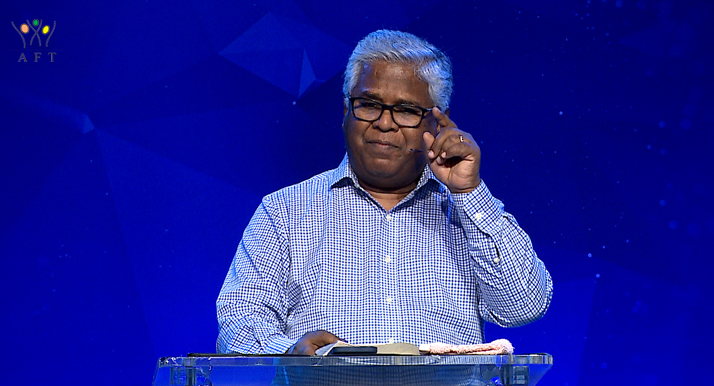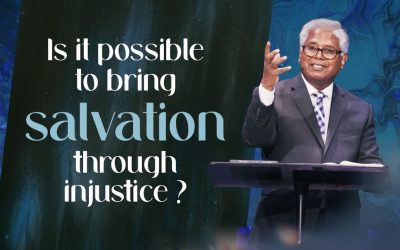
Abounding Grace (Vol. 36) – The law and the promise
Sunday English Service – 05 SEP 21
Transcript
Let’s go to the Word of God. Please turn with me to Galatians, chapter 3. I want to read from verse 10 onwards, all the way to verse 22. Galatians chapter 3, verse 10 onwards, all the way to verse 22: For as many as are of the works of the law are under the curse; for it is written, “Cursed is everyone who does not continue in all things which are written in the book of the law, to do them.” But that no one is justified by the law in the sight of God is evident, for “the just shall live by faith.” Yet the law is not of faith, but “the man who does them shall live by them.”
Christ has redeemed us from the curse of the law, having become a curse for us (for it is written, “Cursed is everyone who hangs on a tree”), that the blessing of Abraham might come upon the Gentiles in Christ Jesus, that we might receive the promise of the Spirit through faith.
Brethren, I speak in the manner of men: Though it is only a man’s covenant, yet if it is confirmed, no one annuls or adds to it. Now to Abraham and his Seed were the promises made. He does not say, “And to seeds,” as of many, but as of one, “And to your Seed,” who is Christ. And this I say that the law, which was four hundred and thirty years later, cannot annul the covenant that was confirmed before by God in Christ, that it should make the promise of no effect. For if the inheritance is of the law, it is no longer of promise; but God gave it to Abraham by promise.
What purpose then does the law serve? It was added because of transgressions, till the Seed should come to whom the promise was made; and it was appointed through angels by the hand of a mediator. Now a mediator does not mediate for one only, but God is one.
Is the law then against the promises of God? Certainly not! For if there had been a law given which could have given life, truly righteousness would have been by the law. But the Scripture has confined all under sin, that the promise by faith in Jesus Christ might be given to those who believe.
As you know, there has been a big gap between the last time I preached and this day. For many weeks, I have not preached. But back then, I preached on grace that abounds. We started a series on grace that abounds, and we talked a lot about grace. And finally, we talked about the book of Galatians. And I want to continue a little bit into the book of Galatians before we finish the series. That is why I read this passage, and this passage is one of the most difficult passages to understand, but I’ve heard great Bible teachers say that if you unlock the meaning of this passage, understand the meaning of this passage, that is like unlocking the understanding of the whole Bible. That is why this is very significant.
The subject matter of this passage is what was going on in Galicia, a problem that was going on in Galicia. Now, let me just a minute summary of what was the background for the Galatians (the book of Galatians). Paul is writing a series of churches in Galicia that he had founded, along with Barnabas, in the first missionary journey that he undertook. After touring that area called Galicia and establishing several churches in various towns and cities there, they returned to Antioch of Syria to report to the church that sent them out. They came and reported that many Galatians have come in, they said it this way: that God had opened the door of salvation to the Gentiles. So, they’re seeing a new move that a lot of Gentiles are now coming in.
Now it seems like some of the Judaizers from Jerusalem had gone there after Paul had left that area at Galicia, which is the present-day Turkey. Some of the Judaizers — Judaizers means the people who have believed in Christ but they still insist on the Jewish system — they’ve gone there and they started teaching those people about observing the Jewish law, not only the 10 Commandments, but also all the sacrifices and all the things like circumcision and so on, all the observances that the Jewish people observe. And they taught them in that way, and it caused great confusion because Paul had taught them saying that circumcision is not necessary. Observance of the law, as it was given to the Jewish people, is not necessary for their salvation, you see. But these people have gone in there and they started teaching. The difference between what Paul taught and what they taught is this: these teachers who infiltrated the Galatian church, said, “First believe in Jesus Christ, and secondly, obey God’s Law and then you will be saved”. But what Paul taught was first believe in Jesus Christ, then you will be saved, and then you obey the Laws of God. Okay? Now, there’s a big difference. They believed that obeying the Laws of God is the thing that saves you. They believe that the law is the thing, observance of the law, is the thing that leads to salvation, along with faith. They said, “Believe and obey, and you will be saved”. Paul said, “Believe and be saved, then you will be obeying God and His Commandments”.
So, these teachers and what Paul taught, they come from two different angles. These teachers said, “Faith and obedience go together, and that it produces salvation”. But Paul said, “Faith and salvation go together and produces good works”. It’s a totally different thing. They’re two different religions, if you want me to say the right way. It’s not like some intramural match, where you play between two different teams, belonging to the same school, like in a friendly match, you know. The game will not be so competitive, because it’s within the school. Some people think of this issue like that, that in Christianity, there are these two groups: one believes in the law; the other believes in the grace. So, we’ve got these two kinds of people within the Christian group, they think. But I tell you, that these are two totally different things. Why? Because they produce completely different results in people’s hearts and lives. See, the ones that believe that it is by faith in Jesus Christ and the law, by observance of the law, that you’re saved. They, it produces a different kind of people, in heart, and in life. If you believe that you need to believe in Jesus Christ, and by believing in Him you are saved, that produces a different kind of life and heart. It produces a completely different result of character in these two different groups. You can see the difference, stark difference, between the ones that believe that you need to follow the law in order to get saved, and the ones who believe that you just believe in Jesus and be saved. It produces a completely different spirit. They’re completely different narratives. They have a completely different way of looking at everything. They are really two different paradigms. There are two different morals, literally. There are two different ways of looking at every part of reality, every part of life. They’re really two different religions, so to speak.
Now Paul, is having to deal with this situation. He had gone and preached, and a lot of people have believed in Jesus and come into the church. Now, these people are going and causing the confusion. The problem is, are people saved through the law? Or are they saved through Jesus by faith in Jesus? Is it the law or grace? Are people saved because God has promised that He will save them or are people saved because they’ve observed the law? This is the issue here. Now, why is this a big issue? It’s a big issue because if you don’t understand salvation properly, if you don’t understand this issue, and how it relates to salvation, you will never understand the whole Bible. There is a great deal of confusion in understanding the Bible today. A lot of people think of the Old Testament as old and not necessary today because the New has come, the Old is no more valid, they think. They have some wrong attitudes and opinions about the Old Testament. That is because they don’t understand the salvation. They don’t understand this issue between law and grace and so on. They are not able to understand what the Old Testament says and understand what the New Testament says and how they relate to one another.
Now, look at how Paul goes about teaching the Galatians on the question of law and grace. They are saying, “Law, law, law; obey the law”. Paul deals with it, making a statement that God in His Grace has given to Abraham, the inheritance, verse 18, says, “God has given to Abraham the inheritance, that is salvation and all that it entails. God has given to Abraham through a promise and not through the law”. He puts it in verse 18, in this way: For if the inheritance is of the law, it is no longer of promise; but God gave it to Abraham by promise. So how did Abraham receive the inheritance, the inheritance of the salvation, and all that goes with it? He received it by, not by the law, but by the promise. God simply promised and he believed, and he got it. Now, if that is so, if the law is not required for salvation, if the observance of the law is not required for salvation, then in verse 19 Paul says, “Then, what was the purpose of the law? Why did then God give the law?”
Now, that’s the right way to go about it. I like the way Paul goes about it. A lot of people deal with this situation and they take it, and they go something like this, they’ll say, “This is the New Testament and that is the Old Testament. That is old, outdated, and therefore, it is not progressive. Therefore, we don’t like it. We don’t want it because we’ve got the New Testament”. Now, that is arrogance, I would say, when you say something like that. There are not proper arguments put forth in favour of what you believe; they’re just simply arrogant statements. So, what if something is old? Something cannot be wrong, just because it is old? It is nobody who’d say that? You know, you can’t say just because something is old, it is not necessary. Paul does not say, “Well, this is New Testament and not the Old Testament. So, let’s put away the Old Testament; let’s put away the old things”. That’s not the way he approaches it, you know. He does not say this part of the Bible is not effective anymore. It doesn’t matter anymore. I don’t believe that; that’s obsolete because it’s old, it’s Old Testament, you know. Paul does not believe that. He does not believe that the Old Testament teaches something else and New Testament, a totally different something else. Paul believes that the Bible is one. Paul does not believe that the Bible is a confused model of all kinds of things contradicting one another. Paul believes that the Bible is a very coherent, cohesive book. It speaks about the same thing. The Message is one; the Saviour is one, God is one. There is not an Old Testament God, New Testament God; there is not an Old Testament way of salvation and New Testament way of salvation. The way of salvation is the same. It all speaks about the same, you see.
So, he says, “What is the purpose of the law?” And then he explains. He explains the Christian doctrine of salvation. I think that’s the way to do it. He explains the Christian doctrine of salvation. You see, if the law seems to contradict the Gospel, it seems to go against the Gospel, then it means that we didn’t understand the law properly. If you properly understood the law, you would see no contradiction. It’s going together. It’s working together because everything in the Bible works together. Every part of the Bible all comes together, it all agrees, you know. And that is what Paul is trying to show here. And he’s very skilful at that and he’s a great expert at that. And so, how does he do it? How does he go about solving this problem that has now cropped up in Galicia and is disturbing the people? And some of them, I believe, have already started following those people that came and taught this thing about circumcision and so on. They told them you need to get circumcised, you need to follow the Jewish law, you know, not only believe in Jesus; do this, then only will be saved. And Paul is wanting to tell them, “No, you believe in Jesus, you get saved, and then you do what God’s Word says.” They’re totally different things. And how does he go about convincing them of that?
Now, this is something that will help us understand the Bible. That’s why this passage is very important. It’s a difficult passage, but let’s really try to understand that. The way Paul tries to solve this problem is that he divides time based on two people. He divides time based on two people. He divides time as Abrahamic era, and the era of Moses – two people heading through different times.
First of all, let’s deal with Abraham. He presents Abraham in Galatians, chapter 3, in verse 6 itself, he starts. But we didn’t read verse 6; we read from a later verse. But let me read from verse 8: And the Scripture, foreseeing that God would justify the Gentiles by faith… See, this is what has given rise to all this problem. In the initial stages, mostly Jews got into believing in Jesus, and there was not much problem and Gentiles started coming in, it gave rise to a lot of problems. And Paul says, “This thing about Gentiles coming in, is not to be looked at as something strange. God has already seen that, foreseen that, and the Scripture declares it”, he says. Scripture declares that God would justify the Gentiles by faith, and therefore preached the Gospel to Abraham. You know, the Scripture preached the Gospel of Abraham, beforehand, saying, “In you, all the nations shall be blessed”. Now, he’s quoting Genesis, chapter 12, verse 3. Remember Genesis chapter 12, verse 1, 2, and 3, where God calls Abraham, tells him to go to the country, which He will show and He says to him, “I’ll bless you, make you a blessing. And I’ll bless those who bless you, curse those who curse you, and make your name great. “In you”, verse 3 says, “Shall all the families of the earth be blessed.” Now, that is an amazing promise. In you shall all the families of the earth be blessed.
So, Paul says, “Look at that, that every family of the earth will be blessed through Jesus, through Abraham”, God said. In you shall all the families of the earth be blessed. How can, in Abraham and through Abraham, all the families of the earth be blessed? He explains that. Go to verse 16. Now to Abraham and his Seed were the promises made. He does not say, “And to seeds,” as of many, but as of one, “And to your Seed,” who is Christ. You know, the promises that God makes to Abraham, about the land and, and so on, He makes those promises to Abraham and to his seed. You read that, in Genesis, chapter 3, verse 15, to 16. It comes in many places, slightly different words, but it’s the same thing. You also get it, Genesis, 17:8; you get it in Genesis 24:7, and so on. And all of those verses, say the same thing, slightly different words are used. It simply says, “I’ll make you a great nation, I’ll give your descendants this land to live in. And in your seed, shall all the nations be blessed”. Some modern translators translate it as, ‘in your descent; it’s your descendants’. Instead of seed, they translate it as ‘descendants’, because seed actually means descendants. Some translate is translate it as ‘offspring’. They translated it as offspring. So, because that is the common word, that is the common understanding, they translated it as ‘descendant’, ‘offspring’. But the original word is ‘seed’ – in your seed, right?
Now, Paul makes a big deal out of this. You might say, he makes a big deal out of nothing. No. For him, the Word of God is so important, so believable, so important, so inspired, that every word counts. Every word he feels, is inspired by the Holy Spirit, and it carries meaning. So, he says, “Look at what was promised Abraham”, he says. God promised Abraham; the promises were made to Abraham. And when it was made, God does not say, “And to seeds,” as of many, but as of one, “And to your Seed,” who is Christ. In other words, he says, “God didn’t say ‘seeds’, in plural; he said ‘seed’, in singular.” He points that out. In other words, the promise was made to Abraham and to his seed, which is one person, not many. It actually says it like that: “not to many”. In other words, it’s the promise is not to Abraham and all his descendants; the promises to Abraham and to his seed, referring to one, he says, in verse 16. Who’s that one, one person? The one person is Christ!
So, the promise is to Abraham, and then to Jesus, and through Jesus, to everybody, because in verse 29, it says, “If you are Christ’s, then you are Abraham’s seed”. Ah! See, if you put your faith in Christ, and believe in Jesus, you come into Christ. So, to Abraham, and to his seed, the promise is given. When you believe in Christ, put your faith in Christ, you are in Abraham, you are Abraham’s seed and it says, “heirs according to the promise” – that’s verse 29. “That’s how every family in the earth will be blessed”, he says. In you shall all the families of the earth be blessed, meaning that Abraham, the promises to you, and to Jesus, who will come as one of your descendants, but the promise is not to all the descendants, the promises to you, and to Jesus. And everyone that is in Jesus is considered as the ‘seed’; it is promised to them. So, they become the recipients of the blessing of Abraham.
Now, what is promised Abraham is not just an earthly blessing; it is not just an earthly inheritance. It is a blessing. A blessing is a very big word, you see. It is a blessing. What kind of blessing? There’s an indication of this in verse 14, or verse 13, and 14, in Galatians, chapter 3. Christ has redeemed us from the curse of the law, having become a curse for us (for it is written, “Cursed is everyone who hangs on a tree”), that the blessing of Abraham might come upon the Gentiles in Christ Jesus, that we might receive the promise of the Spirit through faith. He’s talking about why Jesus died on the cross and became cursed. Why? Because the blessing of Abraham, that is what God had promised as blessing to Abraham, may come to the Gentiles, through Christ, through the seed, Abraham, and the seed, right? So that may happen – cross happened – the death on the cross, happened, he says. So, what does he mean? What is that blessing? You know, ‘blessing’ is a very big word with a big meaning. Blessing is not a simple thing. It is not like, you know, an ordinary thing. It is something extraordinary. What is blessing? If you go to Numbers, chapter 6, there is an interesting definition of blessing, you will find there. Numbers, chapter 6, verse 23, God is teaching the people of Israel to bless the nation, bless the people. He’s teaching the Priests, how to bless. He’s telling Moses to tell Aaron and his sons to bless the people in this way. He gives them the exact words, listen to this: “Speak to Aaron and his sons, saying, ‘This is the way you shall bless the children of Israel. Say to them — and then he gives the words — “The Lord bless you and keep you”. What does it mean to be blessed? What does it mean to say, “The Lord bless you?” What will happen if you say, “The Lord bless you?” He gives the meaning indication here. “The Lord bless you and keep you; The Lord make His face shine upon you”. So, blessing means that God makes His face shine upon a man. That means, that man is someone upon whom God looks at with great favour. God’s face shines upon him. “And be gracious to you; The Lord lift up his countenance upon you”. That’s exactly what it means. The Lord looks upon you with favour. It’s another way of saying, “May the Lord look upon you with favour; may the Lord shine His glory upon you. May He look or look upon you with favour, “And give you peace”. Peace is shalom. Shalom means there is nothing missing, and there’s nothing broken.
So, what is ‘blessing’? Blessing is something that is given when God makes His face shine upon a man, or a people and when God is gracious to them; that’s blessing. When God lifts up His countenance upon them, that’s a blessing. And God gives them peace, that is prosperity, that everything works out, there is nothing missing, there is nothing broken, that is blessing. Wow. I’d like to have that blessing, wouldn’t you? That’s blessing.
So, when God blessed Abraham, and God promised the blessing to Abraham, it was not just some land, but it’s something more than that. What did God promise? According to Galatians, chapter 3, verse 14, that the blessing of Abraham might come upon the Gentiles in Christ Jesus. How does the blessing of Abraham come upon the Gentiles? He must make His face shine upon them. And He must lift up His countenance upon them, give them favour, give them peace, and He must keep them, and He must be gracious to them. Right? How does it happen? It says, “The blessing of Abraham might come upon the Gentiles in Christ Jesus, that we might receive the promise of the Spirit”. Ultimately, that happens, when God sends His Spirit to dwell in men. That’s the blessing of Abraham. We might receive the promise of the Spirit, through faith. If you receive the Spirit, you have received God into your heart. God lives in you. That’s the greatest blessing, my friend! God’s face has shined upon you. He has lifted up His countenance towards you. He has shown you favour; He has looked upon you with favour. He has been gracious to you because He lives in you. There is not going to be anything missing, anything lacking because you’ve got the blessing of having God in you.
So, I would say that ‘blessing’ means that a man gets God, God Himself. Blessing means the Spirit, the Spirit of God, which is God Himself, comes and lives in man. And man becomes partaker of God’s nature. How does this blessing come to Abraham? This is amazing. The blessing if you think about it like that; that’s ultimate. The greatest blessing is to have God in your life. The greatest blessing is God’s face shining on you. The greatest blessing is God lifts up His countenance before you. The greatest blessing is that He is gracious to you, and that He gives you peace, prosperity. That’s the greatest blessing; that puts you over. That’s why we say, “blessing is the power to succeed”. When you’ve got blessing, you’ve got God, and you will succeed.
How does this blessing come to Abraham? “It comes through promise”, he says. How does it come? It comes through promise. Verse 18 says, in Galatians, chapter 3, For if the inheritance is of the law, it is no longer of promise. If the inheritance that God promised, which is more than just a land, it’s a blessing, God Himself is the inheritance. If that’s what God promised, if it is by promise, it is no longer, if the inheritance is by the law, if it comes to you by the law, by observing the law, it is no longer by promise. But how does it come? It does not come by the law, it comes by promise because it says, “but God gave it, God gave the inheritance to Abraham, by promise”. So, if it is by the law, then it is no longer a promise. But the fact is, God didn’t give it Abraham, by the law because when Abraham was there, there was no law. Law came with Moses, 400 years later. So, obviously Abraham could not have received the promise, the blessing, the inheritance, by the law, because the law was not even there. It was 400 years before the law, so how did he receive it? He received it by a promise; God simply promised. And Abraham simply believed and he got it.
How do you give someone some inheritance by a promise? Suppose I want to give a lakh (100,000 rupees) to someone. I call them up and say, “Look, I feel I should give you 1 lakh (100,000 rupees); I have it ready, I have it sitting here. Please come and get it. It’s all ready, it’s yours, come and get it. What does he have to do? He doesn’t have to do anything. He doesn’t have to beg, pray, you know, kneel down and cry to me or something like that, you know. No, he doesn’t have to do anything. I’ve already told him, “I want to give it to you. It’s ready, come get it”. All he’s got to do is just come and get it. Just believe and take it! Yes, that’s how we receive salvation. Not by begging, crying, and doing all those things. He made everything ready. So, we just come and get it. That’s giving through promise.
How do you give through the law? How do I give through the law? Giving through the law is something. If I want to give 1 lakh, but I want that guy to do something for me. If he behaves, and if he does something, certain things and fulfills his obligation on his side, then I promise to give him something. So, I say to him, “Come and do all this work, complete it and give it in fine shape, then when you complete it, I’ll pay you 1 lakh”. That is giving through the law. There’s a difference. In giving through the promise, everything depends upon the ‘promiser’, the one who promises. Nothing depends upon the ‘promisee’, or the one to whom things are promised, doesn’t have to do anything, whether he’s good or bad, what he is, it doesn’t matter. Because the one who promises has decided to give it to him. Everything depends on him. If the promiser is good, if he will keep his word, if he is truthful, if he is full of love, and if he keeps his word, he will do it! Everything depends upon the promiser. And our promiser is good – God. You can’t get anything better than Him. If He promised, He would do it. But if you go by the law, if you try to get it by the law, then everything depends upon the promisee, the one to whom the inheritance is promised. That is why the law is not desirable to go through. Because it depends upon the promisee, the one to whom things are promised. If he is going to go by the law, then he’s got to be perfect. He’s got to perfectly fulfill the law. He’s got to live by it, walk by it, every moment of the day, cannot make one mistake. If he makes one mistake, he disqualifies. You can see, very well, that by the law, he cannot have it at all. There is only one way to get the inheritance. That is by promise. Because man is in sin, no one is capable of keeping the law. If you tried to keep the law, you will only learn that you’re not able to keep the law. You will never be able to keep the law. That’s the only thing you’re going to learn. So, the only way you can get the inheritance is by promise.
And look at how God makes that promise to Abraham. God says, “I’m going to give it to you”. He doesn’t say, as long as you do this and that, I’ll give it. No, no, He doesn’t say that. Look at Genesis, chapter 15. Go to Genesis, chapter 15, and go to the place where God actually gives that promise. Chapter 15, verse 7: Then He said to him, “I am the Lord, who brought you out of Ur of the Chaldeans, to give you this land to inherit it.” And he said, “Lord God, how shall I know that I will inherit it?” He says, “All right, great promise but how shall I inherit it? Tell me, how do I know that I will inherit it? How do I know that I’ll have it? So, He said to him, “Bring Me a three-year-old heifer, a three-year-old female goat, a three-year-old ram, a turtledove, and a young pigeon.” Then he brought all these to Him and cut them in two, down the middle, and placed each piece opposite the other; but he did not cut the birds in two. See, God said, “Go get these animals and birds”. And he went and got it. He knew exactly what to do; God never told him what to do with it. He knew because it has been the custom of the people in that day, to make agreements like that. We do agreements today with a lawyer, writing up the agreement, we call a couple of witnesses, and both parties sign the agreement with a couple of witnesses signing in, and we register it, right? That’s how the agreement is done. But back in those days, there was no such thing. No signatures, no witnesses, nothing. How do they do it? It was a very solemn thing. They took an animal, they cut the animal into two pieces. And both the parties making the covenant would walk in between the pieces. And when they walked in between the pieces, they will say something like this. They will say, “If I did not perform my promise to you, may I become like this dead animal. May I be cursed as this animal and dead as this animal. May I be cut to pieces like that”. That’s what they would say.
So, he knew exactly what to do. So, he came and cut the thing into two pieces without God ever telling him and he got ready. Then the vultures came down on the carcasses. Abraham drove them away. Look at verse 12, Now when the sun was going down, a deep sleep fell upon Abraham, and behold, horror and great darkness fell upon him. A great darkness fell, deep sleep came. Now listen to this. Then he said to Abraham— God is now speaking Abraham— “Know certainly that your descendants will be strangers in a land that is not theirs” … Now it’s the promise-giving time; the covenant partners make promises to one another now. “That your descendants will be strangers in a land that is not theirs, and will serve them, and they will afflict them four hundred years”. God is telling him, 400 years ahead of time, about what will happen to his generations, the Israelites, in Jacob’s day, and Joseph’s day, and later. “And also, the nation whom they serve I will judge; afterward they shall come out with great possessions”. God told them about the exodus, way back then, 400 years before. “Now as for you, you shall go to your fathers in peace; you shall be buried at a good old age. But in the fourth generation they shall return here”. God tells the year, calendar, the program is given, clearly. “Fourth generation they shall return here, for the iniquity of the Amorites is not yet complete.”
Verse 17, And it came to pass… Now listen to this. The story continues. What happened to the animals that were cut in half, and kept when the darkness fell over, right? And then, the story shifted to God giving promises. And then, now again, it comes back here. And it came to pass, when the sun went down and it was dark, that behold, there appeared a smoking oven and a burning torch that passed between those pieces. On the same day the Lord made a covenant with Abram, saying: “To your descendants I have given this land, from the river of Egypt to the great river, the River Euphrates—the Kenites, the Kenezzites, the Kadmonites, the Hittites, the Perizzites, the Rephaim, the Amorites, the Canaanites, the Girgashites, and the Jebusites.”
So, God makes the promise to your descendants. “I have given this land”, He says. Now, the thing is this: when the darkness fell, horror of great darkness fell upon Abraham. Abraham has cut the animals into pieces; he knows exactly what to do. He is now waiting for God to instruct him because he knows what they do next, because he knew how to cut the animals. He knows what exactly happens next; the two covenant partners must walk in between the pieces. So, he’s waiting for God to get down there and walk with him. But lo and behold, to his shocking amazement, God never calls him into the thing. He walks, God seems to walk alone in the midst of the pieces, between the pieces because that smoking oven and the burning torch that passed between those pieces, is God passing in between those pieces and making the covenant with him. God passing between those pieces. What does God say? God says, “I’m promising this to you, and if I don’t fulfill the promise that I make this day to you, that I will do all these things that I have just said, let Me be like these cursed animals that died here. Let Me die like this, let My life be taken out of Me”. That’s what He says. And not only that, but He also says something else. He says, “Even if I have to be cut to pieces like this, in order to perform what I have said, I will do it. Even if I have to die, even if I have to give My life, even if My body will be tortured and cut to pieces, like the animal’s body that I’m walking in-between, I will still perform it. Even if I have to give My life.”
You know, many, many centuries later, another great darkness fell, as Jesus was hanging on the cross. What was happening? God had to literally give His life, die, become the sacrifice. He became the sacrifice Himself. He had to give His life, so that people may have life. God did it. So, God promises like that. The promise is amazing. God says, “If I have to die like this, like these animals cut, to pieces, let it happen to Me. I will still perform My promise.
One great preacher says it like this: You know, what God said it seems, as He walked between the pieces, as He was saying, “Even if I have to be killed and die like this, I’ll still do what I said”. He was saying, “May my immutability become mutability.” He’s an unchanging God; immutability is unchanging. Right. May my immutability, may My unchanging nature become changing nature. That means, He’ll become less than God. My infinity. May My infinity because finity. Infinity means that He is without limits. He says, “May my infinity become finity.” That means, if you become finite, then you’re not limitless anymore; you’re less than God. Then He says, “May I, who’s the God of the impossible become only the God of the possible. May I die, may I be cut up, may I be cut off”. That is exactly what He was saying, it seems. The thing is, God never asked Abraham to pass through the pieces. What does it say? It says, it means that it doesn’t matter what Abraham does. There is no place where you see more strongly, the salvation is an agreement. But it’s not an agreement between two people. It is not a matter of law. It is a matter of promise. Salvation is a matter of promise. God is promising, on His life He is promising. He says, “Even if I have to give My life, I’ll do it”. God says, “I’ll do this; I’ll bless you. I’ll give my spirit. I will save you. I will work My salvation into your life. Not only can you trust Me, but you can even trust you, because whether or not you listen to Me, I will listen to you. Whether or not you’re faithful to me, I will be faithful to you, even if I have to be killed, I’ll do it!” And guess what? He had to be killed and He did it. He allowed Himself to be killed.
So, Paul is saying all of this, in order to say, that it is not by law, it is by promise. There is no place anywhere in the Bible that is a stronger statement of the fact that salvation is by the promise and not by the law. The promiser is the only thing that you need; everything depends upon the promiser; nothing depends upon us. Thank God for that. Nothing depends upon us. All I have to do is just come and get it. All I have to do is just put my faith in it. All I have to do is just come and just thank Him and receive it. He’s got it ready. He says, “Come and get it.” And all I’ve got to do is just believe Him, believe His Word, and come and get! God went through the pieces; Abraham did not. So, we don’t go through the pieces, we don’t do anything. We don’t suffer, we don’t die for our sins. He has done all of that. We simply come and get it. There are people that are ready to torture themselves for the sins that they have done. They feel like they have to take it upon themselves, literally, whip themselves so that they can be punished for their sin. But God says, “The chastisement of our peace was laid upon Him, and by His stripes we are healed”. That is salvation, my friend.
So, Paul divides time into two periods: the period of Abraham, the period of Moses. Firstly, he deals with the period of Abraham. He proves that Abraham lived before the law, therefore, he could not have been saved by the law, by observance of the law. How was he saved? He was saved by the promise. What kind of promise? The kind of promise that is recorded in Genesis, chapter 15. God promised and He did it at the cost of His own life; He did it. That’s how He was saved. He was saved by a promise. The inheritance was given to him by a promise, not by the law. This is how he received it. And then, Paul goes to Moses, but he doesn’t mention Moses by name, in Galatians, chapter 3. The only way Moses is mentioned is when he mentions the law. When he mentioned the law, Moses is in there because the law came through Moses, right. So, he’s talking about Moses. And what does he say in verse 19, in Galatians chapter 3? He says, “What purpose then does the law serve?” We already looked at how God gave the inheritance to Abraham by promise. If it’s by promise then you have to take it by faith, right. That’s what happened. He has given it by promise; there was no law. It was not by law. Thank God it was not my law! If it was by law, we would have never got it because we’ll fail, we’ll never qualify. It is by promise and by faith.
And verse 19 says, “If it’s not by law, only by faith; if it’s through a promise that is given, then why was the law given? Why was the law ever given?” Paul gives the reason. He says, “It was added because of transgressions, till the Seed should come to whom the promise was made.” It had a purpose, it seems. The law is not against the Gospel, the law is not against the whole scheme of things, you shouldn’t hate the law. The law served a purpose. The law was added because of transgressions, to do something. Till the Seed should come, till Jesus came, the law had a purpose. To whom the promise was made; till the Seed should come to whom the promise was made. The promise was made to Abraham and his seed; the Seed must come, Jesus must come. Until then, the law was needed for a purpose. What was the purpose? It was appointed through angels, by the hand of a mediator. Now a mediator does not mediate for one only. But God is one. Is the law then against the promises of God? Certainly not! Is the law then against the promises of God. No, no, no, it has come to help it, not against it. It is all being worked in the one and the same scheme. Is the law against the promises of God? Certainly not! For if there had been a law given which could have given life, truly righteousness would have been by the law. But the Scripture has confined (imprisoned, locked up, tied up) all under sin… So many words are used in the translations in English language. The word ‘imprisonment’ is used, ‘confined’ is used, ‘locked up’ is used, ‘shut up’ is used. Scripture has confined, imprisoned, shut up, locked up, all under sin. Until Jesus came, what the law has done, is that it has come, and it has kept everybody prisoned under sin, that the promise by faith in Jesus Christ might be given to those who believe.
Now, let me explain this. He says, basically, the reason the law and the promise actually agree in Christian life, or the promise is not against the law; the law is not against the promise. They actually agree. The reason they agree in Christian life and in the Bible, there are two reasons for it. One, they agree because the law is here to show us the need for the promise. The law is serving the promise in that way. The law is here to show the need for the promise. Secondly, the promise, shows the scope of the law. So, the problem is also helping the law; they are mutually helpful to one another. They’re not against one another. They’re all functioning in the way they ought to function.
Let’s look at the first: the law shows us the need for the promise. In what way does the law show us the need for the promise? If you listen to the law, it says, if you listen to the law properly, in a way that you understand it, it’s not saying, “Thou shalt not kill; though shalt not commit adultery; thou shalt not bear false witness; thou shalt not steal”. It’s not saying that. For example, it’s not saying, “Thou shalt not kill”. You know what it’s really saying? A lot of people don’t understand the law, so if they read it like that, they say, “Oh, thank God, I never killed anybody; I’m fine”. It says, “Thou shalt not kill”, certainly, I’ve not murdered anybody. You will never accuse me of murder. Most of us have never murdered anybody, so immediately, they feel a consolation. That means, you don’t understand the law. You don’t understand the law, in the sense that it is saying it. It is not saying, “Thou shalt not murder”, even though the words are like that. It is actually saying something more than that. Look at Jesus’s interpretation of it in the Sermon on the Mount. He said, “You shouldn’t even get angry at your brother, you shouldn’t even call him a fool, you shouldn’t even have a hatred against your brother”. See, the anger, the hatred, the word spoken such as “fool” against your brother, all of this, leads to murder later on. But even that anger, that hatred, that enmity, that you have, the thing that you have against him, is not right; that is not right. So, a lot of people will hear that and say, “Oh yeah, that’s right brother. I don’t have any enmity. I don’t have any hatred. No, I don’t despise him. I don’t call him a fool, and I have nothing in my heart against him”. But the law, the law is not satisfied with that. The law says, “That is not enough”. Then what is enough? The law says, “All right, you haven’t murdered. You don’t have anything in your heart; you have no enmity, no animosity, no hatred, fine. But do you have love? Can you love him?” Now, this is where everything breaks.
So, if you truly understand the law, you’ll read it like this. You will not read it as, “Thou shalt not murder”. You’ll read it like, “Thou shall love”. That’s the way you should read it. You will not read it as, “Thou shalt not lust”, you will read it as, “Thou shall love”. You will not read it as, “Thou shalt not steal”, you will read it as, “Thou shall love”. When you love, you will not be stealing; when you love, you will not be murdering; when you love, you will not be bearing false witness; when you love, you won’t be doing any of those things. It’s a positive virtue, its talking about; it’s not just the negative, ‘don’t do’ business. It is something positive that it is referring to, but it’s putting it in the form of a negative. When a person truly understands the law, he understands that he can’t do it. When a person says, “Oh, my God, I’m finished, I’m done, I can’t do it”, that person understands the law. That is why, when the law was given, sacrifices were given side-by-side because when God gave the law, He knew that nobody will be able to fulfill the law. So, He gave the sacrifices.
So, how is a man saved? What is the Old Testament preaching? The Old Testament never preached, never intended to preach, never, never, ever insinuated even, that the law is something that could save! The Old Testament is preaching, that the law cannot save. If you ask the law itself, the law itself would tell you, “Hey, I’m trying to show you, I cannot save you! Nothing can save you! The law cannot save you; this was not given to save you!” How can you be saved? Only by the sacrifice. Only by the sacrifice. Are you there? Only with the sacrifice can you be saved.
Now, this is amazing to me, really. This is why the law was given. The law was given, so that it shows us the need for the promise. It tells me, no, no, no, the law could not save me because how could it save me? I can’t do it. If I can do it, it will save you but I can’t do it. That’s the problem. So, what do I need? I need the promise. I need the promise route; that’s the route I can be saved. Right. So, the law makes us prisoners to sin. It binds us up by simply saying, “Look at your transgressions; look at yourself”, which makes us feel guilty. It locks us up, it imprisons us. It makes you feel guilty. If you listen to the law, it will bind you up, it will knock you out, it will throw you down. That’s why Paul talks about it like that. It was given to do that to you, so that you will cry out and say, “Oh God, have mercy. I will not rely on the law; I will not rely on the law; the law is not there for me to rely on. It has done its job; it has shown me that it can’t save me. I’ll come to you, Lord. By Your mercy, by Your grace, save me”. So, the law shows us the need for salvation, by promise. If you read the Old Testament, you have to read it in this way. The Old Testament never taught that the law, saves; never, ever taught.
Secondly, the law shows us the scope. The law shows us the need for the promise, right. The law shows that we need the promise, only through that, we can be saved. Secondly, the promise shows us the scope of the law, how far the law can take us. What is the capacity of the law? What is the range of the law? What does the law cover? What is the law about? What is it talking about? What is the scope of the law? What is the law really saying, when it says things like I said, “Don’t kill”? What does it mean? What is the scope? The scope is not that you don’t kill in the sense of you have not committed the act of murder. It’s not even the scope of saying, “Well, I don’t have any bitterness, evil or any hatred or animosity inside my heart”. Really, the extent is even more. The scope is even more; it goes all the way to, “Do you love?” Are you able to love? That’s where it takes you, you see. That’s how Jesus interpreted it on the Sermon on the Mount and we looked at it plenty of times during this series itself.
So, I say to you. Only if you know you’re saved, apart from your works, will you ever be able to admit what the law demands. Only if you know you’re saved, apart from your works; you cannot be saved by works. If you know that only, you will be able to appreciate what the law demands. Otherwise, you won’t even be able to appreciate what the law demands. If you think you can be saved by your good works, then you are a person who doesn’t understand that you cannot appreciate the law at all. Therefore, you’ll never take it seriously, because you’ll never be able to see what the law demands, so how can you take it seriously? Only if you know what it demands, then only you can take it seriously and who can know what it demands? Only a person who knows that he cannot be saved by the law. Only a person who knows that he’s saved apart from the law, without the law, some other way. Only that person can know the demands and expectations of the law and only such a person can take it seriously. So, the only people who can take the law of God seriously are the people who know, it can never save them. Only people who can ever take the law seriously are people who believe salvation is by promise, it cannot be by the law. Once a person understands that, then he can appreciate the law very much, because he knows the scope of the law. He knows how much the law covers. He knows that it doesn’t simply mean, “You shall not murder; you shall not steal”. It’s much more than that. He knows the depth of it as Jesus interprets it. They’re the only people who can listen to its demands. They’re the only people who can really admit what it demands. They’re the only people who can seek to obey it, without feeling crushed by it every second. Isn’t that something? They’re the only people that can even seek to obey it, without feeling completely guilty. They’re the only people who will ever love the law.
Now, listen to this. They are the only people who ever loved the law. Have you ever read what David says? He says, “I love thy law, Oh, Lord”. “Oh, how I love they law”, he says. “It is sweeter than honey to the mouth”, he says. Have you ever read that? How can a man love the law so much? How can a man love the law so much? He could really say that because he really understands it. He really understands it. Why does he appreciate the law so much? I’d say, if you understand the law, you’ll dread it because it threatens you, it makes you feel guilty, it crushes you, it tells you you’re a sinner. Then, why would you love it? If that’s what the law does, why would you love it? Why does David love it? He loves it because it’s the thing that showed him that it can’t save him, that he needs the mercy of God, the lovingkindness of God. If it didn’t show him that the law cannot save him, if it didn’t tell him that his self-righteousness cannot save him, if it didn’t tell him that his good works cannot save him, his works of the law cannot save him, he would have gone on trying it and he would’ve wasted his time and all of his efforts and sweat will be on that. And he would have failed miserably. It’s the thing that showed him what is the way; it’s the thing that showed him only, if God forgives your sin, is merciful toward you, then you can be forgiven. You can come and get God. You can have God’s favour, God’s blessing, in your life. It showed him that only by promise, it’s possible. That’s why he loves the law of God.
Let me read to you Romans, chapter 6, Paul refers to this thing about David, why he loved the law. Look at Romans, chapter 4 rather, he talks about how a man is justified, how does a person get saved. He gives two examples: Abraham and David. Why two examples? Because Abraham lived before the law, he uses him to show that since he lived before the law, he could not have been saved by the law; he was saved by grace, through faith. He was saved because God promised him and God did what He promised and Abraham believed and got it. But then he goes on to David. He says, in verse 6, and he gives David’s example because David is exactly the opposite of Abraham. He lived under the law; he was born when the law was in effect. But even though he was living under the law, he knew that the law could not save him; the law could not make him righteous. Look at verse 6, just as David also describes the blessedness of the man to whom God imputes righteousness apart from works. In other words, Paul says, “David describes the blessedness of the man to whom God imputes righteousness apart from works”. In other words, he says, David says, “Blessed is the man who knows that God gives righteousness or imputes righteousness apart from works”; it’s not by works that God considers a man righteous. It’s apart from works, some other way! How? He says, David says in the Psalms it seems and Paul is quoting, “Blessed are those whose lawless deeds are forgiven”. Wow, he knows it very well. He knows that if they start putting marks for him on the basis of his behaviour and what he had done, he will get a zero. He will be an utter failure. He says, “Blessed are those whose lawless deeds are forgiven”, he has been forgiven. He’s been washed, he’s been cleansed, he is the one that cried out, “Create in me a clean heart, O God, and renew a right spirit within me. Take, not away, Thy Holy Spirit from me”, he said. “And renew a right spirit within me”. He cried out for forgiveness when he’d sinned, and he had experienced it. He didn’t stand on his righteousness, he didn’t try to say, “I’ve done this much good and that much good; I’ve given so many, this and that to so many people; I’ve done so much charity, so you better be good to me”. No, he said, “I know why I sin, Lord. My mother conceived me in sin, in inequity and in sin was I conceived. That’s why I sinned. In birth itself, sin has gotten into me, it’s got power over me. That’s why I sinned. I ask your forgiveness”, he said. He says, “Blessed are those whose lawless deeds are forgiven, and whose sins are covered;
Blessed is the man to whom the Lord shall not impute sin”. Instead of putting a sin on him, God puts His forgiveness on him, His grace on him, makes His face shine on him, lifts up His countenance on him, gives him His favour, and is gracious to him. That man is blessed! He says, “Blessed is the man”.
Let me ask you, my friend, are you blessed? Are you blessed in that way? Have you experienced this blessedness? Or are you a person who is counting on the law, and how good you are, and counting on your good works and keeping score, and still under the impression that you’ve been good enough and that you deserve better and all that business? The law was given, nowhere in the Bible does the law teach that it can save anybody. The only thing the law ever came to teach is that it cannot save; you can be saved only through promise. And the promise, if you ask the promise, it will show you how much the law covers. The scope of the law is so great, that nobody can escape it, everybody’s a sinner. Everybody is counted in; everybody has got a circle around them. They are drawn in, as sinners, they’re locked up, imprisoned, and kept so that Jesus can come, the Saviour could come, the Seed could come, and set them free, as they put their faith in Jesus.
Shall we pray?
How to live by faith during evil times? | Habakkuk 1:1-17 | Sam P. Chelladurai | 7-Jan-23
தீமைகள் நிறைந்த சூழ்நிலைகளில் விசுவாசத்தினால் வாழுவது எப்படி? | Sam P. Chelladurai | 7-Jan-24 | AFT
தீமைகள் நிறைந்த...
தேவன் பேசியிருக்கிறார்! நீங்கள் விசுவாசிக்கிறீர்களா?
தேவன் பேசியிருக்கிறார்!...
God has spoken! Do you believe it?
God has spoken! Do you...
ஆராதனையின் புதிய ஏற்பாட்டு அடிப்படைகள்
ஆராதனையின் புதிய ஏற்பாட்டு...
New Testament basics of Worship
New Testament basics of...
இயேசுவில் உள்ள தேவ மகிமையை ருசித்துப்பாருங்கள்! (பகுதி 2)
இயேசுவில் உள்ள தேவ மகிமையை...
Taste and see God’s glory in Jesus! (Part 2)
Taste and see God's glory in...
இயேசுவில் உள்ள தேவ மகிமையை ருசித்துப்பாருங்கள்!
இயேசுவில் உள்ள தேவ மகிமையை...
Taste and see God’s glory in Jesus!
Taste and see God's glory in...
















